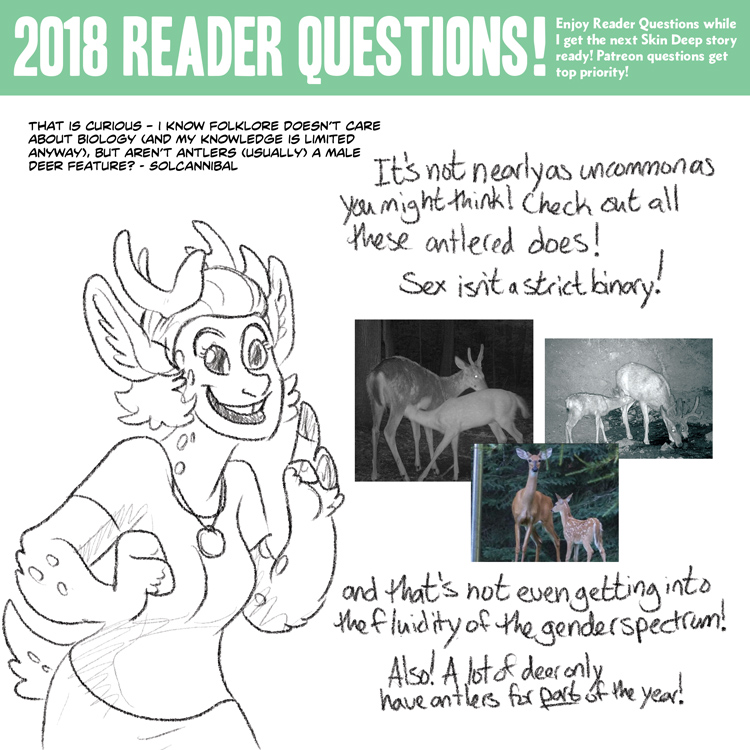Sexual dimorphism in various species is really interesting and, like everything else in this world, there are always rulebreakers. Rulebreakers forever!!
Edit: there’s been some confusion on this question. When I mention the gender spectrum I am talking about the sapient creatures that belong to a sexually dimorphic species. Gender doesn’t really apply to unintelligent species.


21 Comments
To add onto this; Male Reindeer shed their antlers at the beginning of December, while females keep their antlers throughout winter. Using this logic; all of Santa’s deer are female, as they are always depicted with having antlers at Christmas.
I have learned two new things today. :)
So, Rudolf is in fact Rudy, Donner is Donna, Blitzen is Blitzy, and Dasher is Dashing?
They’re all dashing (got a lot of presents and only one night), and Rudolf isn’t one of the original Reindeer, and in fact originally there was only one (I couldn’t find a name) but if we go for the 1823 poem by Clement C. Moore we find a verse naming 8 Reindeer:
More rapid than eagles his coursers they came,
And he whistled, and shouted, and call’d them by name:
“Now, Dasher! Now, Dancer! Now, Prancer, and Vixen!
“On, Comet! On, Cupid! On, Dunder and Blixem!
(The poem has since been altered from the Dutch words for thunder and lightning to the German words for the same: “Donder” and “Blitzen” – although that’s now a slightly out of date spelling of “Donner”)
Rudolf it seems, was created for a chain of department stores in 1939 and published as a book to be given to children in the store at Christmas time.
-I only knew that Rudolf wasn’t an original, and that Donder and Blitzen were, the rest I found out from a quick look at Wikipedia…
It’s actually ‘Donner’ and ‘Blitzen’, which mean ‘thunder’ and ‘lightning’ in German. They’re very Victorian-period names for horses, so I’ve always wondered if Moore either had horses of his own by that name or knew of a pair named that and just borrowed the names.
I feel like that santas reindeer are just rebels, keeping their antlers all year. They already break a few rules like gravity and the sound barrier, so whats a little breaking of biological systems?
but they DON’T break the sound barrier. That’s the whole point. if they DID , it would be rolling Sonic Booms across the globe.
They simply slip BETWEEN the sound barriers. ;)
I am aware of the German words Donner und Blitzen, and I thought I’d made it clear with the end of paragraph 3 that I was mentioning the old spelling of Donder.
(I’m trying to learn German, although I haven’t gotten all that far)
And of course “Vixen” is a word for a *female* fox, so. If that reindeer was intended to be male it’s wrong on at least two counts. ;)
There really is a wide range of variation there; where I originally come from (NW Florida, currently known as Hurricane Ground Zero) the little swamp deer have antlers showing up in both sexes, though the males have larger racks. Out where I live now, though (Arizona), only the male mule-deer have antlers. Weird. Look at horns, though– with cattle and goats both, it depends on ancestry: You can breed for hornless cattle and goats, but among wild types both males and females have horns. Unhorned cattle and goats have a dominant gene and tend to have hornless offspring, so in the domestic stock that’s more common (if you breed unhorned stock you don’t have to have ’em dehorned, and hornless cattle can’t gore you.) And then there are antelopes and so forth… it’s just not a good idea to automatically consider something with antlers or horns automatically to be male.
Could we please see a Buffalo Totem?
Perhaps… A Buffalo Soldier?
Can we see an image (or two) of the main cast from both comics aged up to the present?
How does schooling work before a kid receives their medallion? And what about for species without medallions?
Hmm. “Gender spectrum”. Not sure how applicable that concept is to beasties with significantly less cognitive “horsepower” than humans? I mean, whoever heard of a trans German Shepherd, you know?
Then again… if a German Shepherd actually was trans, how would we know?
Actually, there’s a relatively common surgery for dogs and cats with chronic urinary blockages – a problem most common in males – that turns the urinary tract more or less inside out, effectively changing the male into a female. I’ve seen it done twice, both times on orange cats, strangely enough. One named “Anakin Snuggles,” which entertains me to this day.
There is way more to being trans or nonbinary than surgery. A lot actually don’t opt for surgery. On top of that, MTF surgeries are *way* more complicated than that.
I bet there are (at least in species with higher intelligence), but I agree that using gender here may not be correct as the word gender is often used to apply to behavioral/mental traits versus physical ones (sex). It is pretty a complicated topic.
I was referring to the sapient creatures in the comic that belong to a sexually dimorphic race when I mentioned the gender spectrum.
Will we get to see anything of the wolf variety in Skindeep? (really like wolves)
There is a Chechen Wolf in the Bugbear Talisman chapter.
What does this have to do with gender binaries? In some species of deer, both males and females grow antlers, in some species it’s only males. The same is true for cow horns, by the way.